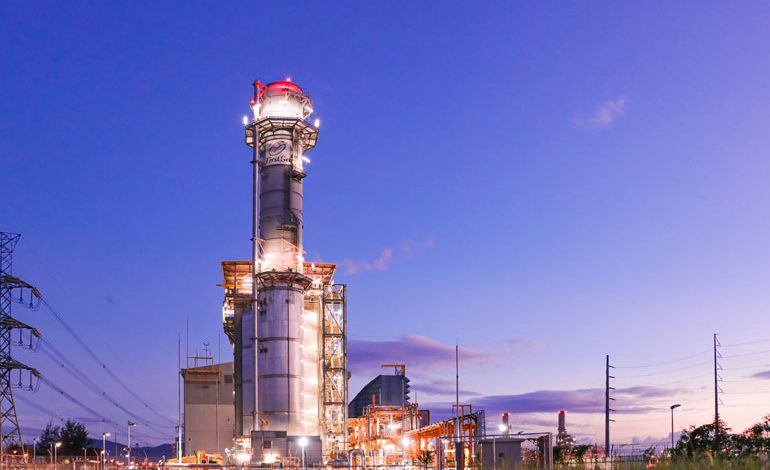Natural Gas: The necessary step to a decarbonized future

The United Nations calls climate change “the defining issue of our time.” In worst-case scenarios, the consequences of climate change range from shifting weather patterns that would decimate global food production, to rising sea levels that would increase the risk of catastrophic flooding that would literally reshape the world we live in.
Without coordinated drastic action, adapting to these impacts in the future will be both difficult and costly. Scientific research from the UN Intergovernmental Panel on Climate Change (IPCC) concluded that limiting global warming to 1.5?C would require “rapid and far-reaching” transitions in land, energy, industry, buildings, transport, and cities.
Essentially, the net human-caused emissions of carbon dioxide (CO2) would need to fall by about 45% from 2010 levels by 2030, reaching ‘net zero’ around 2050. This is why we need to reduce the carbon intensity of emissions, which is a process known as decarbonization.
Yet, as more developing countries grow, the demand for energy will keep rising. The question is, how can countries like the Philippines continue to prosper without also increasing their reliance on emissions-heavy energy sources like coal and oil? While many will be quick to mention a swift transition to renewable energy (RE), the reality is far more complicated.
“The energy transition is critical to achieving carbon neutrality by 2050 as indicated in the Paris Agreement. According to the Global Carbon Budget report in 2020, our carbon budget to limit temperature increase to less than 1.5 degree Celsius can be used up in less than 10 years,” Francis Giles B. Puno, president and chief operating officer of First Gen Corporation, one of the country’s leading providers of clean and renewable power, said.
“If we go too fast in transition, we will be saddled by unreliable and expensive electricity, which will do untold damage to the economy. If we go too slow, we will be unable to mitigate effectively the effects of climate change, and the damage to the economy will also be devastating as we have seen with the calamities due to extreme weather conditions that have hit the Philippines more frequently in recent years. It is critical that we get this transition right,” he added.
The Philippines is fortunate to have great potential for RE, being rich in geothermal, hydro, and solar energy sources. Yet, to best optimize their use, there remain significant steps that need to be made in order to transition from being powered by fossil fuels to RE.
“There are a lot of factors that need to be considered for the energy transition. This may take time due to the intermittency of renewable energy sources and early stages of development of storage technologies. Recent developments show that we are going in the right direction. The implementation of the coal moratorium, ongoing efforts to craft legislation for natural gas, electric vehicles, green energy auctions, among others will help accelerate the transition,” Mr. Puno said.
While the technology for renewable energy continues to develop, there is a need for a transitory solution that would help wean the country from traditional fuels towards solutions with lower carbon emissions. Natural gas will make that transition smoother.
“Natural gas is a bridge fuel that can provide power when intermittent RE sources, like solar and wind, become unavailable. Because natural gas is flexible, it can quickly provide power at night, or on a cloudy day, or when wind speed is not sufficient, as natural gas plants can start up and provide power in as fast as 15 minutes or even less. At a time when storage technologies are still very expensive and scarce, natural gas fills the crucial role of providing affordable complementary power to these intermittent sources,” Mr. Puno said.
“Moreover, natural gas is clean — unlike alternatives like coal — which would also be hard pressed to be able to provide the same function. In short, natural gas will ensure that we keep the lights on while we undergo this transition,” he added.
First Gen Corporation owns and operates 30 power projects across the country with 3,495.2 MW of installed capacity, as of 2020. Its portfolio consists of renewable energy sources such as geothermal, hydroelectric, wind, solar. These renewables are complemented with flexible natural gas, forming a reliable and clean energy portfolio. In 2020, First Gen’s natural gas plants generated over 11,500 gigawatt hours (GWh) of electricity, which helped avoid almost 7 million tons of carbon dioxide emissions, equivalent to removing about 1.5 million vehicles off the road.
The company has four natural gas-fired plants, which are in the First Gen Clean Energy Complex (FGCEC) in Batangas City, with a combined installed capacity of over 2,000 MW.
Moreover, First Gen Corporation ensures that its natural gas assets are operated responsibly and efficiently, with insignificant amounts of fugitive emissions released into the atmosphere. First Gen employs significant efforts to monitor and minimize emissions of harmful substances to way below than allowable levels.
With the urgency of the issue of climate change, there is a pressing need to take action and move the country towards a decarbonized and regenerative energy system. The benefits of natural gas make it the clear next step towards achieving this goal, and First Gen is committed to leading this transformation by meeting the needs of the energy market with competitive, efficient, and environment-friendly energy and power generation assets with the least impact to the environment.
“Natural gas will serve as a transition fuel to the installation of more renewable energy. The fast ramp-up capability of natural gas plants can address the intermittency of renewables and increase their share in total power generation. Natural gas provides a way to increase the share of renewables without having to worry about losing electricity supply when the sun or wind are not available. Equally important, it enables consumers to have an affordable and clean source of complementary power to solar, wind, and other intermittent RE,” Mr. Puno said.
“It is undeniable that the future will be dominated by RE and other non-carbon power technologies, in fact we support the ambition that eventually the Philippines will be totally dependent on zero-carbon power sources. Similar to the rest of the world, we see that natural gas will play a critical role — as we also continue to find options of decarbonizing this fuel source — towards a truly decarbonized and regenerative future,” he added.
First Gen Corporation is the leader in clean and low-carbon power in the Philippines. It has the largest portfolio of clean energy, making it well-positioned to lead the country towards a decarbonized energy future. Learn more about First Gen’s services by visiting www.firstgen.com.ph.
Spotlight is BusinessWorld’s sponsored section that allows advertisers to amplify their brand and connect with BusinessWorld’s audience by enabling them to publish their stories directly on the BusinessWorld Web site. For more information, send an email to online@bworldonline.com.
Join us on Viber to get more updates from BusinessWorld: https://bit.ly/3hv6bLA.




